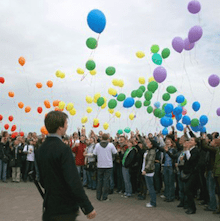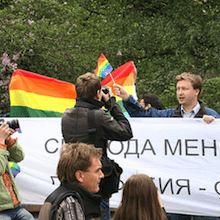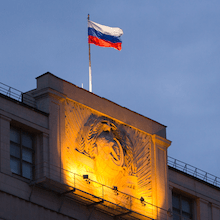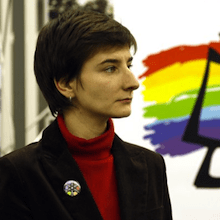Russian LGBT activist Gulya Sultanova talks to Axel Schock about the situation of gays and lesbians in Russia in the face of increasing repression and human rights violations
Gays and lesbians in Russia have had it anything but easy in recent years. However, since the passing of the law against "propaganda for non-traditional sexual relationships" last year, homophobia has been elevated to the status of state doctrine, so to speak.
Gulya Sultanova, co-organiser of the international queer film festival "Side by Side" in St. Petersburg, also felt the immediate consequences. The organisers and visitors faced harassment from the authorities, physical attacks and even bomb threats. For her courage and commitment, 38-year-old Gulya Sultanova and her "Side by Side" comrade-in-arms Manny de Guerre were honoured with the Rainbow Award at the Lesbian and Gay City Festival Berlin in 2013. The Russian LGBT activist Gulya Sultanova (Photo: Воскресенский Петр)In Germany and manySince the adoption of the law against "propaganda for non-traditional sexual relationships", solidarity actions have taken place in other countriest. Are they helpful for you?
Gulya Sultanova: Basically, your support is very important and can make a big difference. The lesbian and gay community here in the country must not be left in the lurch, because we lack the resources in Russia to fight against our government.

What does that mean?
We do work with many journalists, but the opportunities are very limited. We simply don't have a free press. We only reach those people who are active on social media and think a little further ahead on their own. But the majority of the population mainly watches television, and most TV channels are controlled by the state. This means that the programme content is based on what the state thinks is right.
But what use are international protests then? They are not reported on in the Russian mainstream media either.
Russia is involved in many international associations and organisations, not to mention its economic connections. Even if the Russian state is not so open about it, the country is dependent on these contacts, especially with the Western community. That is why everything that is communicated at the official bilateral levels is of enormous importance. Political and economic leaders know that they cannot simply do as they please without consequences.
Does this mean that foreign organisations should primarily influence Russia's national and international partners to exert pressure on the Russian government?
In its protests, the international community should always emphasise that it is not only concerned with the situation of homosexuals in Russia, but also with the violation of the human rights of all Russian citizens. Human rights are currently being violated at all levels and in all social groups, for example by migrants or in relation to voting rights and the press. Political opponents are banned from the country or imprisoned for years without any legal basis.
The West should not give the impression that it only stands up for the LGBT community and that all the other offences are okay or less important. German President Joachim Gauck has done this in exemplary fashion. He justified the cancellation of his visit to the Winter Games in Sochi with the human rights violations in Russia.despite an official ban: courageous demonstrators at Moscow Pride 2008 (Photo: Nikolai Alekseev)
How is this focus on the LGBT community perceived in Russian society??
Homophobia in Russia is very strong. State propaganda is based on the assumption that homosexuality is not actually Russian, but an imported lifestyle. The West's support for gays and lesbians therefore serves as proof of this thesis: "Look, they only support these perverts. They want our country to perish!"

But beyond expressions of solidarity, how can the international community help to improve the situation in Russia?
That is a difficult question. Isolating Russia and its people is not the solution; on the contrary, they need to be involved in international exchange and cooperation projects, such as cultural festivals or educational programmes, as often as possible. Human rights, especially those of LGBT people, should then be consciously addressed. Such cooperation can change a great deal in people's awareness and thinking.
Do you have a positive example of this?
Last year, the Berliner Schaubühne took part in the St. Petersburg Theatre Festival with a production of "Death in Venice", and the artistic director Thomas Ostermeier dedicated the performance to Russia's LGBT community in a short speech. That had a huge impact. Although there were many negative reactions from nationalist groups, there was also a lot of solidarity and discussion about it - in St. Petersburg and throughout Russia.
Is the international criticism really having an effect? Putin appears quite unimpressed in the media and rejects any interference in domestic affairs.
We saw immediately after the law against "homosexual propaganda" was passed that the criticism was not without consequences. At that time, in the summer of 2013, a follow-up law aimed at depriving homosexual parents of their children had already been introduced in the Duma. The pressure from within, but above all at international level, was apparently too great. The bill was withdrawn in September.
Officially, to revise the text version.
Of course, this is just an excuse to save face. Because if the will were really there, it would of course also be possible to work on text details during the proceedings. This is what happened with the "Homosexual Propaganda Act". Two weeks before it was passed, completely new wording was added, such as the term "non-traditional sexual relationships".
Isn't it to be feared that adoption will wait until after the Winter Olympics, when Russia is no longer under so much international scrutiny?
Nobody can say that with certainty. The political system in Russia is simply too opaque. I don't want to make any predictions, but I hope that the law on child abduction will not be put on the agenda again. It will very much depend on how sustained the pressure from the international community will be after Sochi. If interest is lost, then it's all over for us. If the criticism continues, we have hope that our situation will not deteriorate any further. The Rainbow Flashmob in St. Petersburg in 2009 would be a criminal offence today (Photo: Воскресенский Пётрр)Putin also seems to have officially reacted a little to the international criticism. He has at least slightly relaxed the strict ban on demonstrations in Sochi. Will there be demonstrations against human rights violations in Russia?
Russian human rights organisations will certainly not hold such demonstrations because it is not possible. Sochi has been declared a restricted area. To gain access to the city, you need a special entry permit. It takes months to check the people concerned and, of course, all of the country's secret services are involved. Human rights activists therefore have no chance of obtaining such a permit.

Does this mean that ordinary Russian citizens cannot simply travel to Sochi to visit the city and the games?
That's how it is. Sochi is a closed area. Even within Sochi there are absurd regulations. The city is divided into different zones, and not even residents can easily travel from one zone to another, for example to visit relatives. Permits are also required for this. These regulations mean that unwanted protests are basically impossible. If demonstrations do take place, it can be assumed that they are organised by the state.
To what extent can institutions such as the European Court of Human Rights help to put the Russian government in its place?
As far as complaints to the European Court of Human Rights are concerned, Russia is probably in first place. But unfortunately this doesn't achieve much, even if you win in court. We can see this in the case of Gay Pride, for example. The demonstrations have been repeatedly banned since 2005. The Strasbourg court finally ruled that they should be allowed. Russia was also sentenced to pay a compensatory fine.
However, despite this judgement, the situation has not changed so far. Russia has also repeatedly ignored the decisions of the Strasbourg Court in other matters, such as the use of poison gas in the storming of the Dubrovka Theatre in Moscow in 2002, in which 129 hostages were killed. Nevertheless, as human rights activists, we will continue to use this legal process.
What is the situation of those gays and lesbians who are not activists and live more in hiding?
Of course, there are many gays and lesbians who live underground, so to speak. This mainly affects the generation of over 40-year-olds who grew up in the Soviet Union and with the homosexuality paragraph 121. Until it was abolished in 1993, homosexuality was a criminal offence. Gay men were sent to prison, lesbians were often admitted to psychiatric clinics. Since the law no longer exists, a new generation has grown up that lives much more openly and from which most activists also originate. For them, the crucial question now is: live openly as before and thereby expose themselves to acute danger or go back into hiding? Of course, everyone decides for themselves.
Has the general mood in the country changed?
The fear has grown stronger. Recently, we have been hearing and reading in the media again and again about how bad and dangerous homosexuality is and the negative impact it has on the country. Many citizens previously had no particular attitude towards homosexuals at all, but this propaganda has now made them think badly of them. As a result, openly living gays and lesbians have to fear increased social ostracism and many are therefore reluctant to come out. The tendency to withdraw again is clearly increasing. On the other hand, there are also people who no longer want to go underground and decide to do something about it now. In many cities where we would never have suspected it, there are suddenly campaigns and projects.
Are there also gays and lesbians who fear even worse and therefore leave the country?
Unfortunately, this is the case and particularly affects those who have children. They are afraid that they will be harassed and threatened or that one day their children will be taken away from them.
The worse the situation in Russia gets and the more countries are willing to grant asylum to homosexuals, the more the number of people willing to leave the country increases. We know from foreign LGBT organisations that the number of asylum applications for persecution on the grounds of sexual orientation is rising sharply. Russian homosexuals fear further discrimination by the state (Photo: Victoriagrigas)

So fleeing your own country is the only chance to escape repression?
I am sceptical as to whether the hope of a better, non-discriminatory life abroad can actually be fulfilled. I lived in Germany for a year myself and saw how difficult it is for many Russian migrants to find their place in a new country with a different culture and language. Many of those who want to leave are not aware of these difficulties and can therefore be very disappointed.
Homophobia is everywhere, and as an immigrant you have to be open to a different way of life. Many are not ready for this. We will only know in a few years' time how many have actually managed to arrive in a new life.









